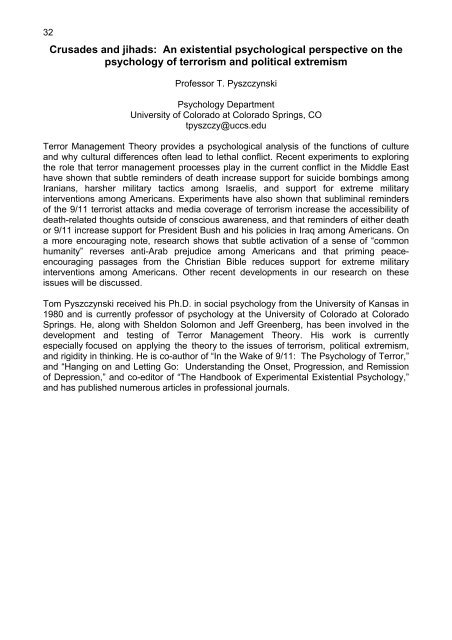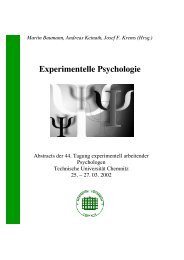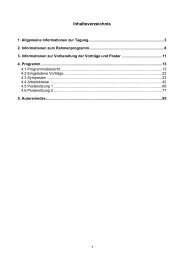- Seite 1 und 2: 5 Vorwort Der vorliegende Band enth
- Seite 3 und 4: Reduktion von Ablenkungseffekten im
- Seite 5 und 6: 12. Theoretical and Methodological
- Seite 7 und 8: 19. Neurobiologie der Angst: von Ro
- Seite 9 und 10: Startle Probe als Emotionsindikator
- Seite 11 und 12: Modulierung des SNARC Effekts durch
- Seite 13 und 14: Ein spezifischer Online Interferenz
- Seite 15 und 16: The Tic-Toc of language. Is there a
- Seite 17 und 18: Depressive haben kein Inhibitionsde
- Seite 19 und 20: 5. The influence of Attention on th
- Seite 21 und 22: 53. Abstract and motor planning - a
- Seite 23 und 24: 104. Generation Effects on Item and
- Seite 25 und 26: 151. Da kenne ich mich doch aus! De
- Seite 27: Metacognition of agency Professor J
- Seite 33 und 34: Nichtintentionale Enkodierung von a
- Seite 35 und 36: Symposium 2 Experimentelle Ästheti
- Seite 37 und 38: Der Wert von Schönheit als Produkt
- Seite 39 und 40: Art and Style: When one Style incre
- Seite 41 und 42: Schließen mit Kausalmodellen B. Me
- Seite 43 und 44: Strategiewahl bei gedächtnisbasier
- Seite 45 und 46: Die Interaktion des Fahrers mit FAS
- Seite 47 und 48: Ansätze zur Evaluation zielgruppen
- Seite 49 und 50: Fehler macht jeder - nur andere? M.
- Seite 51 und 52: Erfassung subjektiver Komponenten z
- Seite 53 und 54: Zusätzliche Beanspruchung durch Be
- Seite 55 und 56: Neuer Ansatz zur Messung der visuel
- Seite 57 und 58: Ventriloquism: A tour of techniques
- Seite 59 und 60: Modulation der Schmerzwahrnehmung d
- Seite 61 und 62: Wann werden Kontextobjekte bei der
- Seite 63 und 64: Repräsentation morphologisch kompl
- Seite 65 und 66: Plasticity in the speech perception
- Seite 67 und 68: Restaurative Prozesse bei der Verar
- Seite 69 und 70: Symposium 10 Emotion und Gedächtni
- Seite 71 und 72: Willentliches Vergessen von negativ
- Seite 73 und 74: Symposium 11 Stress effects on memo
- Seite 75 und 76: Modulatory effects of stress on mul
- Seite 77 und 78: Symposium 12 Theoretical and Method
- Seite 79 und 80:
A Multinomial Model Decomposing the
- Seite 81 und 82:
Symposium 13 Erwerb künstlicher un
- Seite 83 und 84:
Ereigniskorrelierte Potentiale als
- Seite 85 und 86:
Visumotorische Anpassung an variabl
- Seite 87 und 88:
Der Einfluss expliziten Wissens auf
- Seite 89 und 90:
Symposium 15 Wie detailliert sind l
- Seite 91 und 92:
Neurokognitive Evidenz für untersp
- Seite 93 und 94:
Symposium 16 Social and motivationa
- Seite 95 und 96:
„It had to happen“: Exploring t
- Seite 97 und 98:
Tainted truth: Overcorrection for s
- Seite 99 und 100:
Cognitive and affective influences
- Seite 101 und 102:
What Priming can tell about Selecti
- Seite 103 und 104:
Symposium 18 Die Rolle von Emotione
- Seite 105 und 106:
Latente Bewertungsmuster in komplex
- Seite 107 und 108:
Symposium 19 Neurobiologie der Angs
- Seite 109 und 110:
Interleukin-2 in the striatum affec
- Seite 111 und 112:
Symposium 20 Aktive Kontrolle von R
- Seite 113 und 114:
Eine Strategie zur Risikoentschärf
- Seite 115 und 116:
Symposium 21 Psychopharmakologie un
- Seite 117 und 118:
Einfluss von Nikotin auf Hirnaktivi
- Seite 119 und 120:
Symposium 22 Implicit Association T
- Seite 121 und 122:
Speed-Accuracy-Tradeoffs bei der IA
- Seite 123 und 124:
Symposium 23 Temporale Dynamik bei
- Seite 125 und 126:
Elektrophysiologische Korrelate vis
- Seite 127 und 128:
Symposium 24 Aspekte menschlicher Z
- Seite 129 und 130:
Zeitdauerschätzfehler bei der Bewe
- Seite 131 und 132:
Bimodale Integration von zeitlicher
- Seite 133 und 134:
Hands off: Blicksteuerung eines Rec
- Seite 135 und 136:
PC-basierte Risikobewertung von Ver
- Seite 137 und 138:
Emotionen in Go/NoGo-Konflikten: Au
- Seite 139 und 140:
Konflikte als Folge der Verletzung
- Seite 141 und 142:
Self-Regulation after mortality sal
- Seite 143 und 144:
Bad habits in the face of death: Th
- Seite 145 und 146:
Mechanismen des affektiven, semanti
- Seite 147 und 148:
Kategorie-Priming und Antwort-Primi
- Seite 149 und 150:
3. Arbeitskreise Arbeitskreis 1 Vis
- Seite 151 und 152:
Kontextuelle Modulation von Vernier
- Seite 153 und 154:
Simulation und Vorhersage natürlic
- Seite 155 und 156:
Die Formel der Schönheit Ein Algor
- Seite 157 und 158:
Audiovisuelle Interaktionen bei der
- Seite 159 und 160:
Arbeitskreis 4 Gesichterwahrnehmung
- Seite 161 und 162:
The eye illusion J. Yang, A. Schwan
- Seite 163 und 164:
Arbeitskreis 5a Zahlenverarbeitung
- Seite 165 und 166:
Subitizing needs attention: visual
- Seite 167 und 168:
Nachweis räumlich-numerischer Inte
- Seite 169 und 170:
Arbeitskreis 6 Zeitwahrnehmung und
- Seite 171 und 172:
Kontexteffekte und Impulsgeber-Zäh
- Seite 173 und 174:
Arbeitskreis 7 Aufmerksamkeit I Ver
- Seite 175 und 176:
Hängt die Ne/ERN mit der Detektier
- Seite 177 und 178:
Evidenz für aktivierungsabhängige
- Seite 179 und 180:
Arbeitskreis 9 Psychophysiologische
- Seite 181 und 182:
Temporal Cueing von Targetidentitä
- Seite 183 und 184:
Automatische und intentionale Proze
- Seite 185 und 186:
Arbeitskreis 11 Simon-Effekt Erlaub
- Seite 187 und 188:
Automatische und intentionale Proze
- Seite 189 und 190:
Arbeitskreis 12 Koordination von Ha
- Seite 191 und 192:
Ein spezifischer Online Interferenz
- Seite 193 und 194:
Natural images: Too complex for pri
- Seite 195 und 196:
Arbeitskreis 14 Automatische Inform
- Seite 197 und 198:
Subliminales Priming von Merkmalsko
- Seite 199 und 200:
When context affects information re
- Seite 201 und 202:
Arbeitskreis 16 Episodisches Gedäc
- Seite 203 und 204:
Messmodelle für Verbatim und Gist
- Seite 205 und 206:
Arbeitskreis 17 Gedächtnisentwickl
- Seite 207 und 208:
Arbeitsgedächtnisprozesse bei jung
- Seite 209 und 210:
Effects of irrelevant sound on comp
- Seite 211 und 212:
Reading with a salient optimal view
- Seite 213 und 214:
EQUIWORD: A software for the automa
- Seite 215 und 216:
Das Verstehen verdrehter Texte: Wel
- Seite 217 und 218:
The Tic-Toc of language. Is there a
- Seite 219 und 220:
Ökologisch-rationale Strategiesele
- Seite 221 und 222:
Arbeitskreis 22 Entscheiden und Urt
- Seite 223 und 224:
Der Einfluss bereits investierter R
- Seite 225 und 226:
Wie kausalbasiertes Kategorienlerne
- Seite 227 und 228:
Auswirkungen zeitlicher Gestaltungs
- Seite 229 und 230:
Überprüfung basaler psychomotoris
- Seite 231 und 232:
Performanzsteigerung in der Raumvor
- Seite 233 und 234:
Was löst den attentional bias für
- Seite 235 und 236:
Arbeitskreis 27 Emotion und Stress
- Seite 237 und 238:
Performanz in und implizites Gedäc
- Seite 239 und 240:
Ohne Reue! Experimentelle Befunde z
- Seite 241 und 242:
Arbeitskreis 29 Emotion und Persön
- Seite 243 und 244:
Arbeitskreis 30 Motivation Implizit
- Seite 245 und 246:
Mission (Im)possible: Effekte von F
- Seite 247 und 248:
Arbeitskreis 31 Persönlichkeitspsy
- Seite 249 und 250:
Worterkennungslatenzen und implizit
- Seite 251 und 252:
Arbeitskreis 32 Einstellungen I Eig
- Seite 253 und 254:
Arbeitskreis 33 Einstellungen II Wi
- Seite 255 und 256:
Arbeitskreis 34 Soziale Kognition Z
- Seite 257 und 258:
Gewalt in den Medien - Einfluss der
- Seite 259 und 260:
Kooperatives Verhandeln und Fairnes
- Seite 261 und 262:
Die direkten Skalierungsverfahren n
- Seite 263 und 264:
4. Poster Auditive Wahrnehmung Zeit
- Seite 265 und 266:
The influence of Attention on the A
- Seite 267 und 268:
Auditive Halluzinationen bei Magica
- Seite 269 und 270:
Strategische und sequentielle Effek
- Seite 271 und 272:
Zeitliche Vorbereitung verbessert d
- Seite 273 und 274:
Elektrophysiologische Korrelate der
- Seite 275 und 276:
Automatische Informationsverarbeitu
- Seite 277 und 278:
Automatische Bewertungen von Nahrun
- Seite 279 und 280:
Emotion Emotionale Modulation der H
- Seite 281 und 282:
Psychophysiolgical Correlates of Em
- Seite 283 und 284:
Motorik und Handlung Unabhängige K
- Seite 285 und 286:
Der Einfluss des Kontexts auf den R
- Seite 287 und 288:
Die Rolle von Handlungszielen bei d
- Seite 289 und 290:
Reaktionskonflikt oder Fehlerentdec
- Seite 291 und 292:
Einparken und Raumvorstellung - Ein
- Seite 293 und 294:
Relative Fehllokalisation bei sukze
- Seite 295 und 296:
Are you looking at me? Temporal asp
- Seite 297 und 298:
Nehmen Personen mit paranormalen Er
- Seite 299 und 300:
Die Rolle von Synchronizität bei d
- Seite 301 und 302:
Influence of luminance and saturati
- Seite 303 und 304:
Farbkonstanz und chromatische Szene
- Seite 305 und 306:
Zusammenhang zwischen belohnungsrel
- Seite 307 und 308:
Experimentelle Bestimmung der Präv
- Seite 309 und 310:
Gedächtnis Enkodierungs- und Abruf
- Seite 311 und 312:
Hypermnesie - was hilft beim Erinne
- Seite 313 und 314:
Auswirkungen von Stimmung und Affek
- Seite 315 und 316:
Eine Analyse von Protokollen des la
- Seite 317 und 318:
Gedächtnistäuschungen Guessing Bi
- Seite 319 und 320:
Implizites Lernen & Gedächtnis Ein
- Seite 321 und 322:
Learning from Positive or from Nega
- Seite 323 und 324:
Genetische Kopplungsstudie bei von
- Seite 325 und 326:
Der Wettstreit der Hemisphären bei
- Seite 327 und 328:
Chronischer Stress beeinträchtigt
- Seite 329 und 330:
Mentale Repräsentation von wahren
- Seite 331 und 332:
Rezipientenseitige Kompensation reg
- Seite 333 und 334:
Erfolgt der lexikalische Zugriff au
- Seite 335 und 336:
Methoden der Psychobiologie Zerebra
- Seite 337 und 338:
Inhibition von Identitäts-Manageme
- Seite 339 und 340:
Geschlechtsunterschiede beim Betrac
- Seite 341 und 342:
5. Autorenindex A Ackermann, M.....
- Seite 343 und 344:
Coppens, E.........................
- Seite 345 und 346:
Frings, C. ........................
- Seite 347 und 348:
Heinecke, S. ......................
- Seite 349 und 350:
Kassner, A. .......................
- Seite 351 und 352:
Laubrock, J. ......................
- Seite 353 und 354:
Naumann, E.........................
- Seite 355 und 356:
Rey, G. D..........................
- Seite 357 und 358:
Schütz, K. .......................
- Seite 359 und 360:
Vetter, P..........................






